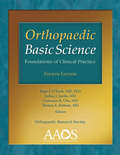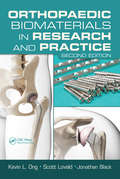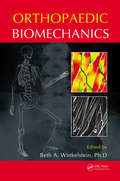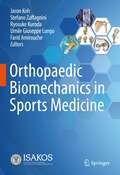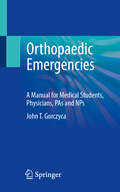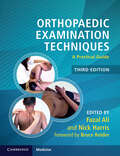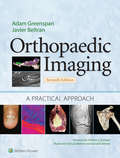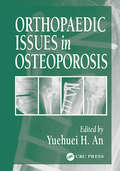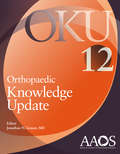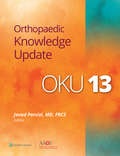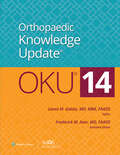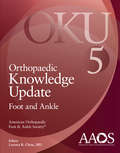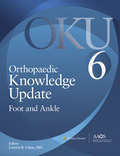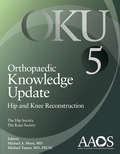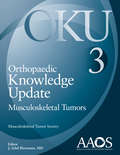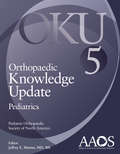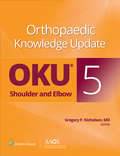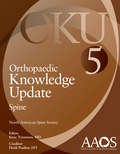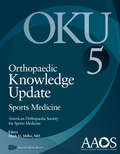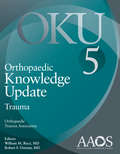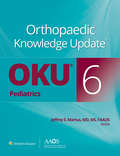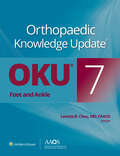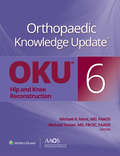- Table View
- List View
Orthopaedic Basic Science: Foundations Of Clinical Practice
by Regis J. O'Keefe Joshua J. Jacobs Constance R. Chu Thomas A. EinhornPublisher's Note: Products purchased from 3rd Party sellers are not guaranteed by the Publisher for quality, authenticity, or access to any online entitlements included with the product. Build your Foundation of Basic Science – from Research to Clinical Application A great tool for MOC preparation! A 'must have' for residency! This fourth edition, developed in a partnership between the American Academy of Orthopaedic Surgeons (AAOS) and the Orthopaedic Research Society (ORS), is your concise and clinically relevant resource for the diagnosis and treatment of musculoskeletal diseases and conditions.
Orthopaedic Biomaterials in Research and Practice
by Jonathan Black Kevin L. Ong Scott LovaldRevised, expanded, and updated, Orthopaedic Biomaterials in Research and Practice, Second Edition introduces materials science and applies it to medical research and treatment. This book incorporates math and engineering, which makes it accessible to trainees and others working in the industry who are lacking primary mathematical and engineering tr
Orthopaedic Biomechanics
by Beth A. WinkelsteinGiven the strong current attention of orthopaedic, biomechanical, and biomedical engineering research on translational capabilities for the diagnosis, prevention, and treatment of clinical disease states, the need for reviews of the state-of-art and current needs in orthopaedics is very timely. Orthopaedic Biomechanics provides an in-depth review o
Orthopaedic Biomechanics Made Easy
by Mrcs Msc Sheraz S. Malik Shahbaz S. MalikOrthopaedic surgeons require not only an understanding of anatomy and clinical sciences, and competence in surgical skills, but also a strong foundation in biomechanics. The application of biomechanics plays an increasing role in modern orthopaedics; for example, correct decisions about the mode of treatment and choice of implants are just as important as operating precisely to reach a specific anatomical landmark. This book simplifies the core principles in orthopaedic biomechanics, giving readers the solid grounding they need to flourish in the specialty. Each topic is covered in a discrete, double-page spread, featuring concise text accompanied by illustrations or tables to give readers a solid understanding of the concepts discussed. This is a must-read guide for orthopaedic trainees at every level, and will be valuable for biomechanical researchers and other professionals in the field.
Orthopaedic Biomechanics in Sports Medicine
by Stefano Zaffagnini Ryosuke Kuroda Umile Giuseppe Longo Farid Amirouche Jason KohThis book presents a fundamental basic overview of orthopedic biomechanics in sports medicine, with a special focus on the current methodologies used in modeling human joints, ligaments, and muscle forces. The first part discusses the principles and materials, including the use of finite element analysis (FEA) to analyze the stress-strain response in the implant-bone interface and design. The second part focuses on joint-specific biomechanics, highlighting the biomechanics of the knee and shoulder joints, their modeling, surgical techniques, and the clinical assessment of joint performance under various kinematic conditions resulting from different repair techniques. Written by international experts working at the cutting edge of their fields, this book is an easy-to-read guide to the fundamentals of biomechanics. It also offers a source of reference for readers wanting to explore new research topics, and is a valuable tool for orthopedic surgeons, residents, and medical students with an interest in orthopedic biomechanics.
Orthopaedic Emergencies: A Manual for Medical Students, Physicians, PAs and NPs
by John T. GorczycaBased on instructional course material utilized by the University of Rochester's Division of Orthopedic Trauma, this concise manual provides a common-sense overview of common orthopedic emergencies that providers with minimal orthopedic training - medical students, non-orthopedic physicians, NPs and PAs - will need to evaluate and treat these cases. Often, a simple understanding of the injury and the priorities of management will allow the treating practitioner to provide appropriate immediate care with huge clinical benefit to the patient. More than a dozen orthopedic emergency situations are presented in an easily accessible format, from open fractures and joint dislocations to septic joint and compartment syndrome. Clinical cases are highlighted at the beginning of each chapter, which also include relevant questions related to the specific case and full color images. An ideal resource for medical students, non-orthopedic physicians, nurse practitioners and physician assistants, Orthopedics in the Emergency Room is a practical guide to managing these intense situations.
Orthopaedic Examination Techniques: A Practical Guide
by Nick Harris Fazal AliOrthopaedic Examination Techniques comprehensively covers the basic examination skills and key special tests needed to evaluate the adult and paediatric musculoskeletal system. Chapters are presented in a clear and logical way to allow readers to understand then master the techniques of orthopaedic clinical examination. Written by a diverse group of chapter authors with extensive experience in teaching clinical examination and who use a uniform system that is taught on national courses, every aspect of musculoskeletal examination is covered in the adult and paediatric patient. Numerous illustrations and new clinical photographs help readers to visualise and understand the key techniques, and five new chapters at the end of the book demonstrate the value of clinical examination through more than 80 clinical case examples. Easy-to-follow throughout, this book is invaluable reading for trainee orthopaedic surgeons, especially those preparing for the FRCS (Tr&Orth) postgraduate examination, practising orthopaedic surgeons, medical students, physiotherapists, and rheumatologists.
Orthopaedic Hand Trauma
by Adam Eltorai Edward AkelmanPublisher's Note: Products purchased from 3rd Party sellers are not guaranteed by the Publisher for quality, authenticity, or access to any online entitlements included with the product. This practical quick reference covers all aspects of acute care of the hand. Structured and formatted for easy, efficient comprehension of up-to-date material, Orthopaedic Hand Trauma helps you assess, evaluate, and treat (including the use of surgical interventions) injuries of the bone, tendon, and nerve that are commonly encountered in the emergency room or urgent care clinic. Each chapter is designed to help you manage patients in an acute care setting.
Orthopaedic Imaging: A Practical Approach
by Adam Greenspan Javier BeltranTrusted by both radiologists and orthopaedic surgeons for authoritative, comprehensive guidance on the interpretation of musculoskeletal images, Orthopedic Imaging: A Practical Approach is an ideal resource at every stage of training and practice. The fully revised seventh edition retains the large images, easy-to-read writing style, and careful blend of illustrations and text that clearly depict all relevant imaging modalities and all pathological entities.
Orthopaedic Issues in Osteoporosis
by Yuehuei H. AnOrthopaedic procedures in elderly patients are challenging and costly. As the population ages these costs will continue to escalate. ORTHOPAEDIC ISSUES IN OSTEOPOROSIS weaves together theory and applications to provide the first reference available on the orthopaedic aspects of osteoporosis. The focus on the management of patients who have
Orthopaedic Knowledge Update 12 (Orthopaedic Knowledge Update Ser.)
by Jonathan N. GrauerOKU 12 brings you a comprehensive synthesis of the latest clinical thinking and best practices across all orthopaedic specialty areas. Keep pace with the rapidly changing body of orthopaedic knowledge and clinical practice with OKU’s objective, balanced coverage in easily accessible formats, including new on-demand, fully-searchable digital versions.
Orthopaedic Knowledge Update 13: Ebook without Multimedia (Orthopaedic Knowledge Update)
by Javad ParviziOrthopaedic Knowledge Update 13 brings you a comprehensive synthesis of the latest clinical thinking and best practices across all orthopaedic specialty areas. Backed by clinical research, informed by practical experience, and rigorously edited by specialty thought leaders, OKU 13 is the most up-to-date resource available anywhere for delivering high-quality orthopaedic patient care today. Keep pace with the rapidly changing body of orthopaedic knowledge and clinical practice with OKU’s objective and balanced coverage.
Orthopaedic Knowledge Update: 14 (Orthopaedic Knowledge Update)
by Frederick M Azar Leesa M GalatzOrthopaedic Knowledge Update® 14, edited by Leesa M. Galatz, MD, MBA, FAAOS, and Frederick M. Azar, MD, FAAOS, brings you a comprehensive synthesis of the latest clinical thinking and best practices across all orthopaedic specialty areas. OKU® 14 covers developments of the last three years with revisions and updates based on new evidence, outcomes, and innovations in the recent literature, including annotated references. Keep pace with the rapidly evolving body of orthopaedic knowledge and clinical practice with OKU’s objective, balanced coverage. Backed by clinical research, informed by practical experience, and rigorously edited by thought leaders across the orthopaedic specialties, OKU®14 is your most up-to-date resource to guide your delivery of high-quality orthopaedic patient care today.
Orthopaedic Knowledge Update: Foot And Ankle 5 (Orthopaedic Knowledge Update Ser.)
by Loretta B. ChouOKU: Foot and Ankle 5 provides a precise blend of relevant information, the current application of knowledge, and supporting references in an all-inclusive foot and ankle resource that will carry you from pre- to post-op, and everything in between. Developed in partnership with the American Orthopaedic Foot & Ankle Society® (AOFAS), this comprehensive resource spans all facets of foot and ankle surgery, with concentrated coverage of significant developments from the past five years, condensed into a single volume for your convenience.
Orthopaedic Knowledge Update: Foot and Ankle: Ebook without Multimedia (Orthopaedic Knowledge Update)
by Loretta B. ChouThis comprehensive text addresses all aspects of foot and ankle surgery in a single, convenient volume. OKU: Foot and Ankle 6 presents relevant, evidence-based information, discusses its practical application, and provides supporting references, all tailored to the needs of today’s practicing orthopaedic surgeons and trainees. Written, edited, and peer-reviewed by dedicated foot and ankle surgeons, it offers a complete guide to the diagnosis, treatment, and management of orthopaedic foot and ankle injuries and disorders, supported by the latest evidence.
Orthopaedic Knowledge Update: Hip and Knee Reconstruction 5
by Michael A. Mont Michael Tanzer, MD, FRCSCExplore the many changes in hip and knee arthroplasty in recent years with completely new information on implants, bearing surfaces, surgical approaches, alternate approaches, risk reduction, and blood management. Expand your knowledge with the standard in adult hip and knee reconstruction, while you advance patient care with the best practices available.
Orthopaedic Knowledge Update: Musculoskeletal Tumors 3 (Orthopaedic Knowledge Update Ser.)
by J. Sybil BiermannLeading orthopaedic surgeons and other specialists collaborated to provide this multi-disciplinary perspective on musculoskeletal tumors. Through their eyes and insights, you will gain a big picture view of the latest innovations in tumor care and optimized treatment. Explore leading-edge research and clinical innovations in pathology, radiology and emerging treatments—in a single, concise volume.
Orthopaedic Knowledge Update: Pediatrics 5 (Orthopaedic Knowledge Update Ser.)
by Jeffrey E. MartusOKU: Pediatrics 5 reflects the substantial number of high-quality studies in pediatric orthopaedics, as well as the most recent clinical practice guidelines and appropriate use criteria. This comprehensive multispecialty resource explores the latest advances in pediatric trauma, sports-related injuries, and upper and lower extremity conditions, with a brand-new section on Neuromuscular, Metabolic, and Inflammatory Disorders.
Orthopaedic Knowledge Update: Shoulder and Elbow 5: Ebook without Multimedia (Orthopaedic Knowledge Update)
by Gregory P. NicholsonSome of todays most respected orthopaedic surgeons have researched and reviewed the latest, most compelling orthopaedic shoulder and elbow content from around the world to give practicing professional easy access to actionable information, new techniques, and thought provoking perspectives. In Orthopaedic Knowledge Update®: Shoulder and Elbow, 5th Edition you will discover the latest advances—along with controversial topics—that impact how you practice today. Gain practical insights from the recent literature, along with new coverage on infections and outcomes for revision shoulder arthroplasty.
Orthopaedic Knowledge Update: Spine 5 (Orthopaedic Knowledge Update Ser.)
by Eeric Truumees Heidi PratherOKU: Spine 5, developed in a partnership between the American Academy of Orthopaedic Surgeons (AAOS) and the North American Spine Society (NASS), is a balanced review of the vastly expanding body of increasingly specialized spine clinical and surgical knowledge to keep you in the forefront of adult and pediatric spine care.
Orthopaedic Knowledge Update: Sports Medicine 5th Edition
by Mark D. MillerOKU: Sports Medicine 5 brings together the most relevant literature and the latest research, including extensive updates in knee and shoulder, from the past five years. Top notch experts collaborated on this succinct review of pertinent advances in sports medicine. Find brand-new content on bone loss instability, proximal biceps injuries, ACL reconstruction, meniscal posterior horn tears, and much more.
Orthopaedic Knowledge Update: Trauma 5 (Orthopaedic Knowledge Update Ser.)
by William Ricci Robert F. OstromOrthopaedic Knowledge Update: Trauma 5 brings together relevant knowledge and new breakthroughs in orthopaedic trauma treatment and management. Developed in partnership with the Orthopaedic Trauma Association (OTA), this new edition features chapters on computer-assisted surgery, new technologies, and the diagnosis and management of infection associated with fractures and nonunions.
Orthopaedic Knowledge Update® Pediatrics 6 (Aaos - American Academy Of Orthopaedic Surgeons Ser.)
by Jeffrey E. MartusOrthopaedic Knowledge Update®: Pediatrics 6 reflects the most recent clinical practice guidelines and appropriate use criteria, as well as the substantial number of high-quality studies in pediatric orthopaedics. This comprehensive multispecialty resource explores the latest advances in pediatric trauma, sports-related injuries, and upper and lower extremity conditions, with brand-new chapters on developmental biology, metabolism, high-energy injury and polytrauma, elbow trauma, knee trauma, and disaster response. Recognized section editors and contributors bring fresh approaches and perspectives, with a focus on delivering a well-rounded update of this rapidly evolving subspecialty. This concentrated guide to new techniques, new approaches, and current controversies is ideal for anyone who treats pediatric musculoskeletal injuries.
Orthopaedic Knowledge Update®: Foot and Ankle 7 (AAOS - American Academy of Orthopaedic Surgeons)
by Loretta B. ChouThis comprehensive orthopaedic resource covers all aspects of foot and ankle surgery in a single, convenient volume. Developed in partnership with the American Academy of Orthopaedic Surgeons (AAOS) and edited by Loretta B. Chou, MD, FAAOS, Orthopaedic Knowledge Update®: Foot and Ankle 7 presents relevant, evidence-based information, discusses its practical application, and provides supporting references, all tailored to the needs of today’s practicing orthopaedists and trainees. Written, edited, and peer-reviewed by dedicated foot and ankle surgeons, it offers a complete guide to the diagnosis, treatment, and management of orthopaedic foot and ankle injuries and disorders, supported by the latest evidence. The OKU® subspecialty series covers most important new developments since the last volume was published in 2019.
Orthopaedic Knowledge Update®: Hip and Knee Reconstruction 6 (Aaos - American Academy Of Orthopaedic Surgeons Ser.)
by Michael A Mont Michael TanzerExplore the many changes in hip and knee arthroplasty in recent years with completely new chapters on thromboprophylaxis, outpatient surgery, pain management, retrieval—hip and knee, medical and biologic treatment of arthritis, nonarthroplasty management, infection, periprosthetic fracture, anatomy and surgical approaches, and dual-mobility cups and large-diameter heads for primary and revision total hip arthroplasty. Expand your knowledge with the standard in adult hip and knee reconstruction, while you advance patient care with the best practices available. Developed in partnership with The Hip Society and The Knee Society, OKU® Hip and Knee Reconstruction 6 examines current research and reviews of the most relevant topics chosen by recognized authorities. Find a wealth of information on cutting-edge developments and approaches for surgically challenging conditions. Orthopaedic surgeons with a specialty interest in hip and knee reconstruction, and physicians and allied health interested in staying up to date on best practices will benefit from this edition. Residents in training can review key topics paired with helpful guidelines and images.
